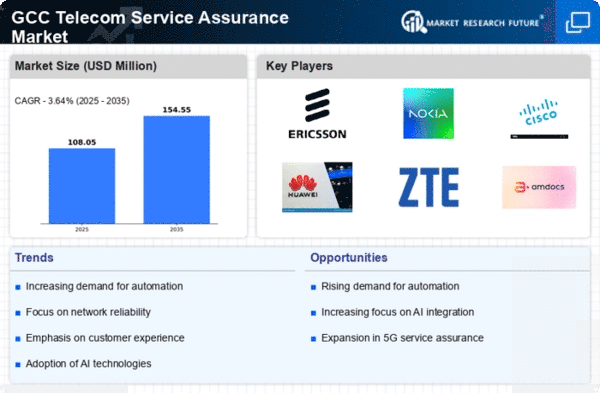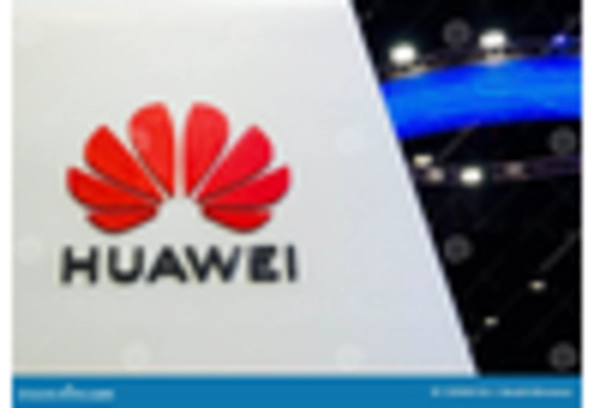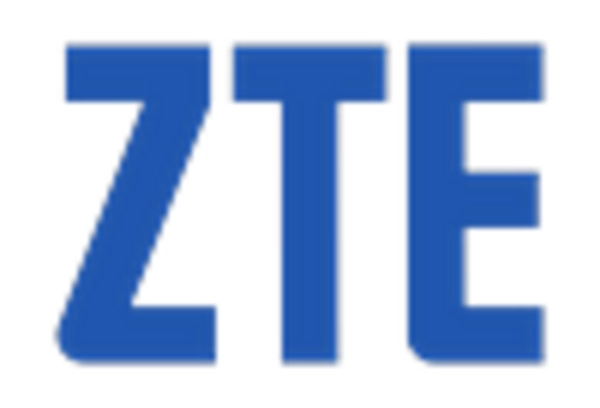Integration of 5G Technology
The rollout of 5G technology is poised to transform the telecom service-assurance market in the GCC. With its promise of ultra-fast data speeds and low latency, 5G is expected to create new opportunities and challenges for telecom operators. The complexity of managing 5G networks necessitates advanced service-assurance solutions that can ensure seamless connectivity and service quality. As operators prepare for the widespread adoption of 5G, they are increasingly investing in service-assurance tools that can monitor and optimize network performance in real-time. This investment is crucial, as the successful deployment of 5G is projected to contribute an additional $15 billion to the GCC telecom sector by 2025. Thus, 5G technology is a pivotal driver for the telecom service-assurance market, compelling operators to enhance their service-assurance capabilities.
Growing Cybersecurity Concerns
In the context of the telecom service-assurance market, growing cybersecurity concerns are becoming increasingly prominent in the GCC. As telecom operators expand their digital services, they face heightened risks of cyber threats that can compromise network integrity and customer data. This situation necessitates the implementation of robust service-assurance solutions that not only monitor network performance but also safeguard against potential security breaches. Recent studies indicate that cyberattacks on telecom networks have increased by over 30% in the past year, underscoring the urgent need for enhanced security measures. Consequently, telecom operators are prioritizing investments in service-assurance technologies that incorporate cybersecurity features, thereby driving growth in the telecom service-assurance market. This focus on security is likely to shape the future landscape of service-assurance solutions in the region.
Shift Towards Cloud-Based Solutions
The shift towards cloud-based solutions is significantly influencing the telecom service-assurance market in the GCC. As telecom operators seek to enhance operational efficiency and reduce costs, many are migrating their service-assurance functions to the cloud. This transition allows for greater scalability, flexibility, and accessibility of service-assurance tools, enabling operators to respond swiftly to changing market demands. Furthermore, cloud-based solutions facilitate the integration of advanced analytics and AI capabilities, which can enhance the effectiveness of service-assurance processes. Recent market analysis suggests that the adoption of cloud-based service-assurance solutions is expected to grow by 25% annually in the GCC. This trend indicates a transformative shift in how telecom operators manage their service-assurance functions, ultimately driving growth in the telecom service-assurance market.
Increased Focus on Regulatory Compliance
In the telecom service-assurance market, an increased focus on regulatory compliance is emerging as a critical driver in the GCC. Telecom operators are required to adhere to stringent regulations aimed at ensuring service quality and consumer protection. Compliance with these regulations necessitates the implementation of comprehensive service-assurance frameworks that can monitor and report on service performance metrics. As regulatory bodies continue to evolve their standards, telecom operators must invest in service-assurance solutions that can facilitate compliance and mitigate risks associated with non-compliance. This trend is particularly relevant as penalties for non-compliance can reach up to €1 million, emphasizing the financial implications of regulatory adherence. Therefore, the increased focus on regulatory compliance is likely to propel growth in the telecom service-assurance market, as operators seek to align their operations with regulatory expectations.
Rising Demand for Enhanced Network Performance
The telecom service-assurance market is experiencing a notable surge in demand for enhanced network performance across the GCC region. As mobile data consumption continues to escalate, driven by the proliferation of smart devices and IoT applications, telecom operators are compelled to invest in advanced service-assurance solutions. These solutions enable real-time monitoring and management of network performance, ensuring optimal service delivery. According to recent data, mobile data traffic in the GCC is projected to grow by over 40% annually, necessitating robust service-assurance frameworks. This trend indicates a critical need for telecom operators to adopt sophisticated tools that can proactively identify and resolve network issues, thereby improving overall customer satisfaction and retention. Consequently, the rising demand for enhanced network performance is a significant driver for the telecom service-assurance market.
















